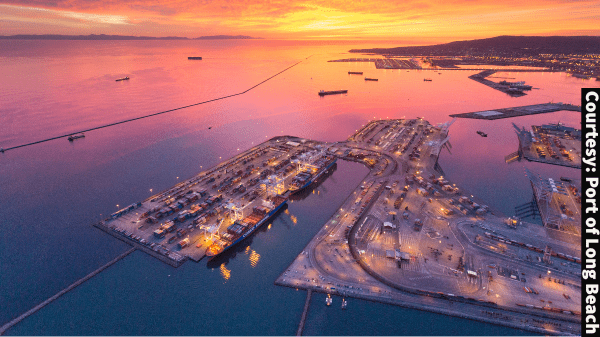The port of Long Beach (CA).
The single most important event affecting the produce industry at the moment is no doubt the proposed settlement of the longshoremen’s strike at West Coast ports. The six-year agreement was reached late yesterday.
The agreement remains subject to ratification by both parties.
The dispute had been dragging on for 18 months. Acting labor secretary Julie Su had flown in on Monday to mediate.
“It now appears that more that significant fallout to the supply chain has been averted: A deal has been reached,” reports Freight Waves. “Late Wednesday night, the Pacific Maritime Association (PMA), representing the terminals, and the International Longshore and Warehouse Union (ILWU), representing workers, announced a tentative agreement on a new six-year contract.”
The deal was reached in time to avert delays in peak season disruptions later in the year. Retail inventories were already at lows, because high interest rates had already motivated some suppliers to slim down their stock, as Brian Pacula, a supply chain expert at consultancy West Monroe, explained to the Financial Times.
“Importers had been braced for shortages and higher prices as the dispute escalated, with agricultural exporters expected to be among the first to be hit,” added the Financial Times.
ILWU president Willie Adams was quoted as saying that his union will now “turn our full attention back to the operation of the West Coast ports.”
Over the previous two weeks, work obstructions had slowed down port activity.
Consequently, prices had risen by 19 percent to $1,569 percent container last week, but it was still 85 percent lower than the previous year, according to Freightos, a freight data provider.
The single most important event affecting the produce industry at the moment is no doubt the proposed settlement of the longshoremen’s strike at West Coast ports. The six-year agreement was reached late yesterday.
The agreement remains subject to ratification by both parties.
The dispute had been dragging on for 18 months. Acting labor secretary Julie Su had flown in on Monday to mediate.
“It now appears that more that significant fallout to the supply chain has been averted: A deal has been reached,” reports Freight Waves. “Late Wednesday night, the Pacific Maritime Association (PMA), representing the terminals, and the International Longshore and Warehouse Union (ILWU), representing workers, announced a tentative agreement on a new six-year contract.”
The deal was reached in time to avert delays in peak season disruptions later in the year. Retail inventories were already at lows, because high interest rates had already motivated some suppliers to slim down their stock, as Brian Pacula, a supply chain expert at consultancy West Monroe, explained to the Financial Times.
“Importers had been braced for shortages and higher prices as the dispute escalated, with agricultural exporters expected to be among the first to be hit,” added the Financial Times.
ILWU president Willie Adams was quoted as saying that his union will now “turn our full attention back to the operation of the West Coast ports.”
Over the previous two weeks, work obstructions had slowed down port activity.
Consequently, prices had risen by 19 percent to $1,569 percent container last week, but it was still 85 percent lower than the previous year, according to Freightos, a freight data provider.
Richard Smoley, contributing editor for Blue Book Services, Inc., has more than 40 years of experience in magazine writing and editing, and is the former managing editor of California Farmer magazine. A graduate of Harvard and Oxford universities, he has published 13 books.




